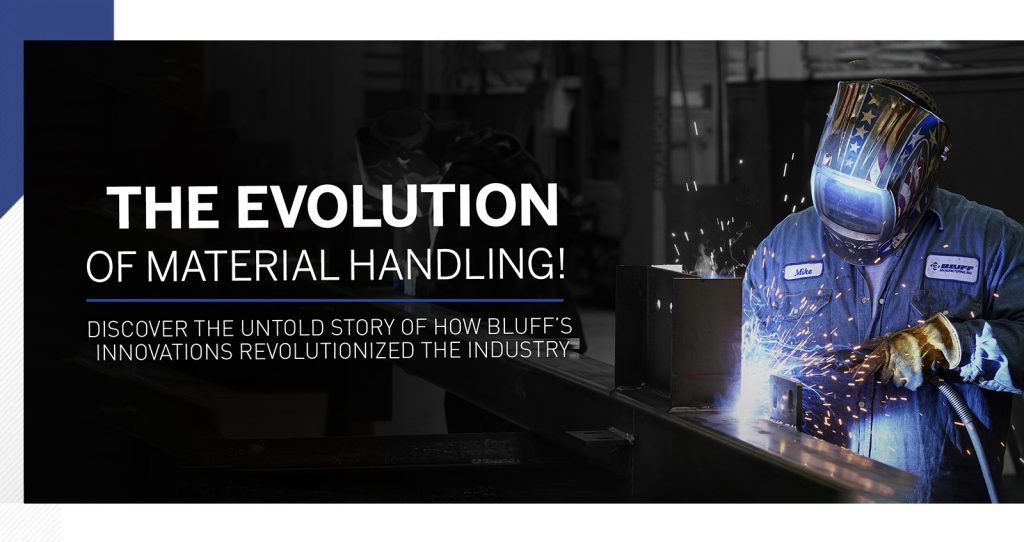Material handling has been a cornerstone of human progress, evolving alongside civilization itself. Explore how Bluff Manufacturing has left its distinctive mark on this ever changing industry.
Although each milestone within the evolution of the material handling industry is unique and complicated in its own way, one aspect of the industry has always remained the same. If you’re receiving, sending or storing materials of any type, you need reliable and efficient tools.
As societies evolve, their technologies and industries adapt to meet new demands. The material handling sector is no different, and its advancements in safe and secure operations helped drive progress across countless industries. This was already happening during the early industrialization of the 19th century. As manual manufacturing methods became outdated, machinery and steam power took over, driving the speed that factories needed parts and materials on the front end, and the efficiency required on the back end to get finished goods to market.
This drove innovations like the steamboat, railroads, and locomotives transforming the transportation of goods, particularly in industries like iron and steel, but also in manufactured goods. This shift laid the foundation for today’s fast-paced, technology-driven material handling systems.
Some 50 years before Bluff Manufacturing came to be, World War II drove the expansion of large-scale manufacturing. Advancements like assembly lines and widespread standardization of pallets for forklift trucks helped companies keep up. The pace and size of the material handling business was rapidly growing, and it needed the right tools to keep up.
These pivotal moments in history laid the groundwork for Bluff Manufacturing’s growth and contributions to the industry. When Bluff was founded in 1968, it didn’t merely adopt existing solutions—it pioneered new ones. Bluff became the first company to attach steel curbs to aluminum plates, a process many thought was chemically impossible. This revolutionized the production of aluminum dock boards and set a new standard for the industry.
“At Bluff Manufacturing, we don’t just adapt to the industry—we lead it by understanding the evolving needs of our customers. Our pioneering work in attaching steel curbs to aluminum plates wasn’t just about pushing the boundaries of material science; it was about delivering a solution that would transform how our customers could meet the growing demands of the material handling world.” – Russell Smith
This fast-paced environment brought a unique set of challenges, and Bluff Manufacturing stepped into the gap. World War II introduced a new expectation for rapid delivery of bulk materials, transforming minor warehouse delays into potentially catastrophic setbacks for a company’s sales and reputation. Many companies struggled to meet these demands, but Bluff rose to the challenge by implementing regional distribution centers—the first material handling company to do so. This strategic move, combined with Bluff’s safety and efficiency-focused dock ramps, transformed business operations. These ramps set Bluff apart from competitors, evolving into fully customizable tools equipped with hydraulic levers and advanced mechanics.
As technology has advanced, material handling has transitioned from predominantly manual processes to a blend of mechanized systems, and now to automation and robotics. Despite these technological leaps, Bluff understands that the hallmark of quality tools is not in their flashiness but in their ability to simplify the customer’s job. By prioritizing practical, user-focused design, Bluff continues to set the standard for innovation that meets the needs of its customers.
Bluff’s products reflect how time-tested methods can be enhanced with new technologies. Their ramps and safety tools reflect the fundamental designs and geometry used as far back as ancient Egypt, yet they adapted those designs to fit a much broader range of needs. Bluff Manufacturing doesn’t merely adapt to technological advancements—it drives them forward. Historical milestones like industrialization have reshaped the way societies operate, and the tools we use have evolved in tandem. This is a process that will continue. Since its founding in 1968, Bluff Manufacturing has embraced this principle, consistently modernizing its products to stay ahead of the curve. It is this commitment to progress and adaptability that continues to define the company today.

